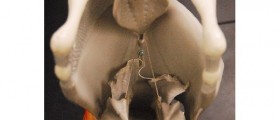
Dysphagia is yet another term for the problems with swallowing. People usually do not pay too much attention to the way they chew and swallow the food but the fact is that improper chewing, as well as eating or swallowing too fast, may cause serious difficulties. Dysphagia or difficulty swallowing may actually refer to more effort or time necessary for a person to swallow either food or fluid, to painful swallowing, or to the total inability to swallow, and it may happen to anyone regardless of age or sex. What’s more is probably every one of us has had similar problem at least once, though older people tend to develop dysphagia a bit more often.
Causes and symptoms
The experts claim that, although swallowing might seem like one of the simplest actions to perform the fact is that 50 pairs of muscles are involved in that process, which only implies that this is definitely not as simple as it might seem. The problems may occur when the lower esophageal muscle fails to relax properly in order to let the food pass into the stomach, when it is narrowed or when it has lost the strength to contract. Gastroesophageal reflux disease, aging, tumors, neurological disorders, chiped lips or palate in children are also some of the causes. There are also the cases in which there is no logical explanation for this problem.
As for the symptoms, the most common are pain when swallowing, inability to swallow, drooling, heartburn which is more frequent than usually, coughing when swallowing, and possibly the loss of weight. In cases of children and infants, signs that may indicate dysphagia are leaking of the food or liquid from the mouth, feeding that lasts longer than half an hour, lack of attention, coughing, choking, or even vomiting during the feeding, and frequent pneumonia.
Possible complications of dysphagia
Even though this problem can be temporary the fact is that dysphagia may cause serious complications and consequences. Since it obstructs the intake of the necessary amount of food and fluid it may lead to dehydration and malnutrition. On the other hand, it may cause the food or fluid to end up in the airway when a person tries to swallow it, and in case this occurs, complications that may develop are respiratory infections or other serious respiratory problems. Depending on the cause of dysphagia, the treatment may consist of simple exercises or the techniques of swallowing, but in some cases, it may also include medicines, or even surgery.




-And-Breathing-Problems_f_280x120.jpg)












Your thoughts on this
Loading...